- NEW: Militant fighters believed to be ISIS seize the Baiji oil refinery, sources say
- United States, Iraq reach agreement over legal protections for U.S. advisers
- John Kerry says Iraqi leaders agree to form a new government by July 1
- U.S. defense official says Iraq's military is plagued with morale, training problems
Baghdad, Iraq (CNN) -- U.S. Secretary of State John Kerry met Iraqi leaders Monday as radical Sunni militants continue their march toward Baghdad during the country's tensest time since the U.S. withdrawal of troops in 2011.
"The future of Iraq depends on decisions made in the next few days and weeks," Kerry said after meeting with Iraqi Prime Minister Nuri al-Maliki, the man who some observers say needs to step down.
Al-Maliki has agreed to a July 1 deadline to begin the process to form a new government, a requirement for U.S. assistance in fighting the Islamic State in Iraq and Syria, or ISIS, Kerry said.
"Our support will be intense, sustained," and will be effective if Iraqi leaders unite to face the militant threat, he said.
With al-Maliki's Shiite-led government losing more ground to ISIS, Kerry implored the leader to rise above "sectarian motivations" to become more inclusive and make the government more representative of Iraq's population.
 Is ruthless general Iraq's hidden hand?
Is ruthless general Iraq's hidden hand?  Iraq: Six things you need to know
Iraq: Six things you need to know  Secret video of ISIS smuggled out of Iraq
Secret video of ISIS smuggled out of Iraq Map: On the ground, who controls what?
Kerry also met with Iraq's foreign minister as well as Shiite and Sunni leaders.
Al-Malaki's office issued a statement after his meeting with Kerry, saying the Prime Minister told Kerry the current situation "poses a threat" not only to Iraq but the region as well. Al-Malaki "called on the countries of the world, especially countries in the region, to take it seriously," the statement said.
But outside the rooms of high-level talks, parts of Iraq are falling by the day. Here's the latest on the crisis that is spilling far beyond Iraq's borders:
Where is Iraq's military?
The United States believes "multiple Iraqi military divisions" outside Baghdad have dissolved and are plagued by problems in morale, leadership, training and equipment, according to a senior U.S. defense official.
"The readiness outside of Baghdad is certainly in question as they have ceded multiple towns. Forces in Baghdad seems to be holding today," the official said.
The United States believes there are around 10,000 fighters who are either affiliated with ISIS or members of the group, the official said, and while they are stretched thin over vast territory, they are getting support in the Sunni areas they increasingly control.
Kerry said Monday in Baghdad that President Barack Obama has prepared "a range of options for Iraq," including enhanced intelligence, joint operations centers, military advisers and "steady supplies of munitions."
But the United States is being more careful about sending additional weapons and ammunition to Iraq, because of a lack of confidence in the Iraqi troops, the defense official said.
ISIS captures more ground
Militant fighters believed to be ISIS have seized the Baiji oil refinery, the largest in Iraq, three Iraqi security sources told CNN Monday.
Earlier in the day, an Iraqi military spokesman had said that an attack was under way, but had been repelled by security forces. CNN cannot independently confirm either claim.
The Baiji refinery is a key strategic resource because it refines much of the fuel needed for internal consumption. There are already long lines at many gas stations across the country.
ISIS militants also advanced toward Baghdad over the weekend from the north and the west. At least 70% of Anbar province is now under the control of ISIS, two security officials in the region told CNN.

 An ISIS fighter takes control of a traffic intersection in the northern city of Mosul, Iraq, on Sunday, June 22. Vast swaths of northern Iraq, including the cities of Mosul and Tal Afar, have fallen as the Islamic State in Iraq and Syria, or ISIS, advances toward Baghdad, the capital. The ISIS militants want to establish a caliphate, or Islamic state, in the region, stretching from Iraq into northern Syria.
An ISIS fighter takes control of a traffic intersection in the northern city of Mosul, Iraq, on Sunday, June 22. Vast swaths of northern Iraq, including the cities of Mosul and Tal Afar, have fallen as the Islamic State in Iraq and Syria, or ISIS, advances toward Baghdad, the capital. The ISIS militants want to establish a caliphate, or Islamic state, in the region, stretching from Iraq into northern Syria.  An ISIS member distributes a copy of the Quran, Islam's holy book, to a driver in Mosul on June 22.
An ISIS member distributes a copy of the Quran, Islam's holy book, to a driver in Mosul on June 22.  Members of ISIS patrol in Falluja, 40 miles west of Baghdad, on Saturday, June 21.
Members of ISIS patrol in Falluja, 40 miles west of Baghdad, on Saturday, June 21.  Volunteers raise their weapons and chant slogans during a parade in the Shiite stronghold of Sadr City, Baghdad, on Saturday, June 21.
Volunteers raise their weapons and chant slogans during a parade in the Shiite stronghold of Sadr City, Baghdad, on Saturday, June 21.  Iraqi men register to volunteer to fight alongside security forces against Sunni Muslim militants and jihadists on Friday, June 20, at a recruitment center in Baghdad.
Iraqi men register to volunteer to fight alongside security forces against Sunni Muslim militants and jihadists on Friday, June 20, at a recruitment center in Baghdad. 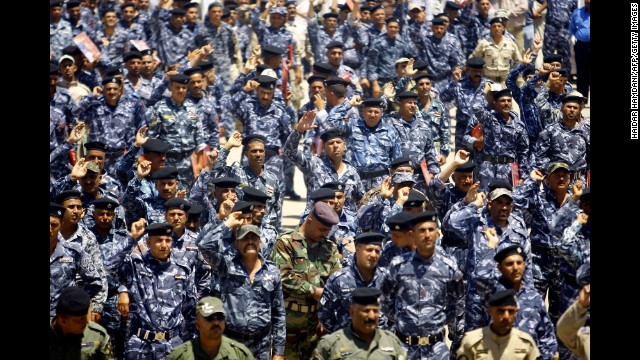 New Iraqi army recruits gather in Najaf on Wednesday, June 18, following a call for Iraqis to take up arms against Islamic militant fighters.
New Iraqi army recruits gather in Najaf on Wednesday, June 18, following a call for Iraqis to take up arms against Islamic militant fighters.  Soldiers with an Iraqi anti-terrorism unit are on guard June 18 in Baghdad.
Soldiers with an Iraqi anti-terrorism unit are on guard June 18 in Baghdad.  A Kurdish Peshmerga fighter injured in clashes with members of ISIS lies in a hospital in Irbil on June 18.
A Kurdish Peshmerga fighter injured in clashes with members of ISIS lies in a hospital in Irbil on June 18. 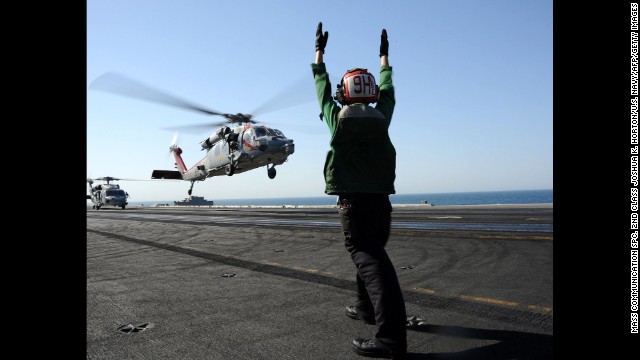 An MH-60R Sea Hawk helicopter lands on the aircraft carrier USS George H.W. Bush in the Persian Gulf on Tuesday, June 17. The carrier moved into the region to give President Barack Obama "additional flexibility," the Pentagon has said.
An MH-60R Sea Hawk helicopter lands on the aircraft carrier USS George H.W. Bush in the Persian Gulf on Tuesday, June 17. The carrier moved into the region to give President Barack Obama "additional flexibility," the Pentagon has said. 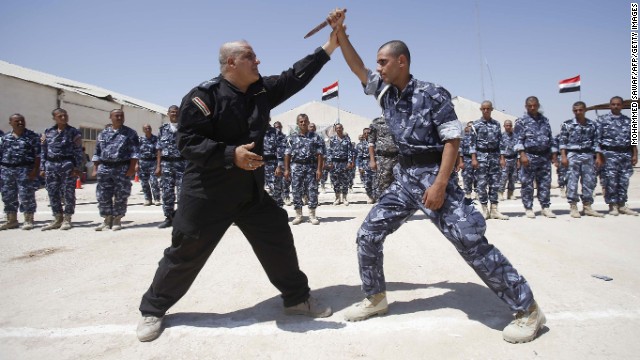 Newly recruited Iraqi volunteer fighters take part in a training session in Karbala on June 17.
Newly recruited Iraqi volunteer fighters take part in a training session in Karbala on June 17.  Iraqi tribesmen gather in Baghdad on Monday, June 16, to show their readiness to join Iraqi security forces in the fight against Islamic militants.
Iraqi tribesmen gather in Baghdad on Monday, June 16, to show their readiness to join Iraqi security forces in the fight against Islamic militants.  Iraqi Christian children gather inside the Church of the Virgin Mary for prayers in Bartala, Iraq, a town near Mosul, on Sunday, June 15. Militants seized Mosul last week, reportedly leading more than 500,000 people to flee Iraq's second-largest city.
Iraqi Christian children gather inside the Church of the Virgin Mary for prayers in Bartala, Iraq, a town near Mosul, on Sunday, June 15. Militants seized Mosul last week, reportedly leading more than 500,000 people to flee Iraq's second-largest city.  Shiite tribal fighters raise their weapons and chant slogans against ISIS in Basra, Iraq, on June 15.
Shiite tribal fighters raise their weapons and chant slogans against ISIS in Basra, Iraq, on June 15. 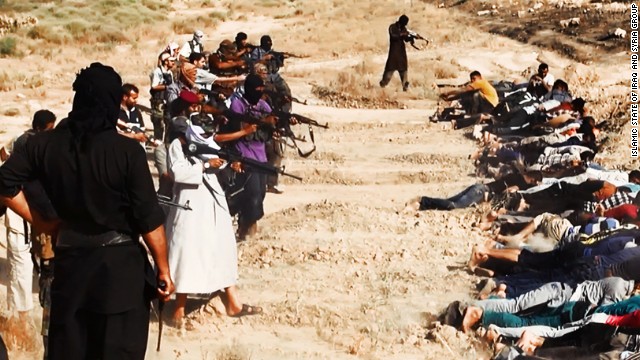 Members of ISIS prepare to execute some soldiers from Iraq's security forces in this image, one of many reportedly posted by the militant group online. CNN cannot independently confirm the authenticity of the images.
Members of ISIS prepare to execute some soldiers from Iraq's security forces in this image, one of many reportedly posted by the militant group online. CNN cannot independently confirm the authenticity of the images.  A woman cradles her baby Thursday, June 12, at a temporary camp set up in Aski Kalak, Iraq, to shelter those fleeing the violence in northern Nineveh province.
A woman cradles her baby Thursday, June 12, at a temporary camp set up in Aski Kalak, Iraq, to shelter those fleeing the violence in northern Nineveh province.  A girl fleeing from Mosul arrives at a Kurdish checkpoint on June 12.
A girl fleeing from Mosul arrives at a Kurdish checkpoint on June 12. 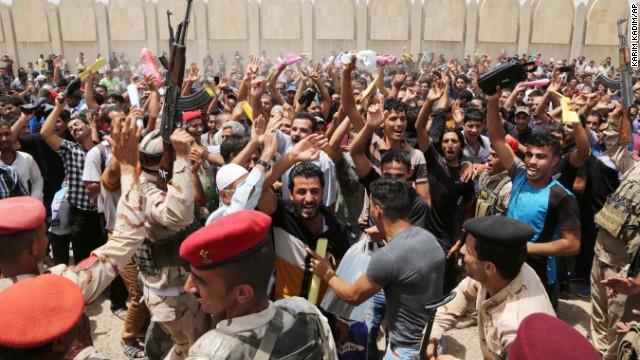 Iraqi men chant slogans outside of an army recruiting center to volunteer for military service June 12 in Baghdad.
Iraqi men chant slogans outside of an army recruiting center to volunteer for military service June 12 in Baghdad. 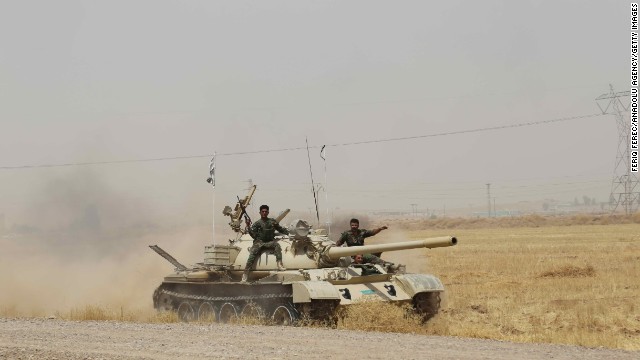 Kurdish Peshmerga forces, along with Iraqi special forces, deploy their troops and armored vehicles outside of Kirkuk, Iraq, on June 12.
Kurdish Peshmerga forces, along with Iraqi special forces, deploy their troops and armored vehicles outside of Kirkuk, Iraq, on June 12. 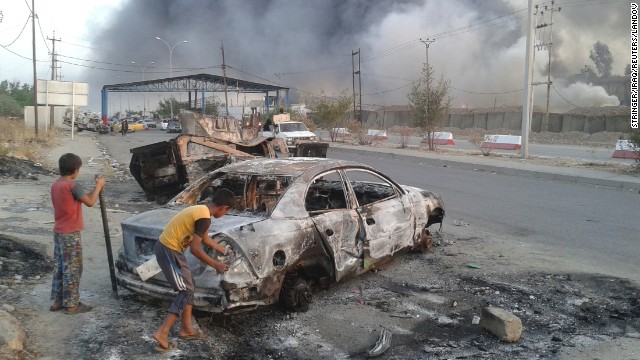 Children stand next to a burnt vehicle during clashes between Iraqi security forces and ISIS militants in Mosul on Tuesday, June 10.
Children stand next to a burnt vehicle during clashes between Iraqi security forces and ISIS militants in Mosul on Tuesday, June 10. 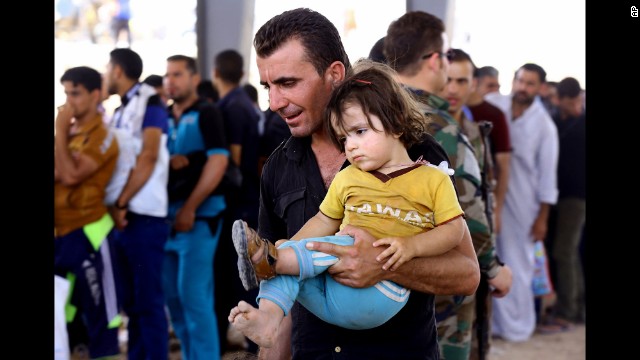 Civilians from Mosul escape to a refugee camp near Irbil, Iraq, on June 10.
Civilians from Mosul escape to a refugee camp near Irbil, Iraq, on June 10.  Iraqis fleeing the violence wait in their vehicles at a Kurdish checkpoint in Aski Kalak on June 10.
Iraqis fleeing the violence wait in their vehicles at a Kurdish checkpoint in Aski Kalak on June 10.  Photos: Iraq under siege
Photos: Iraq under siege  Mass exodus tears Iraqi families apart
Mass exodus tears Iraqi families apart  Kerry: Moment of 'great urgency' in Iraq
Kerry: Moment of 'great urgency' in Iraq  Militants capture chemical weapons plant
Militants capture chemical weapons plant ISIS is on a mission to create an Islamic state across Sunni areas of Iraq and in Syria.
Militants have taken over the Tal Afar airbase in northern Iraq as well as the city of Tal Afar, officials said.
On Monday, Iraqi troops prepared to recapture the airbase, Iraqi Maj. Gen. Abu al-Waleed said. "At least 1,000 Iraqi troops have amassed to the north of Tal Afar and are firing rockets at militants in control of the city," he said.
The fighters also seized the western Anbar town of Rutba, 70 miles (113 kilometers) from the borders of Jordan and Saudi Arabia, security sources in Baghdad and Anbar told CNN on Sunday.
Then there's Qaim. ISIS captured the city along the Syrian border Saturday, and the militants now enjoy a stronghold and a number of other towns in Anbar province. The fighters have a direct line to the western outskirts of Baghdad, where tension simmers just beneath the surface.
Checkpoints in the capital seemed to pop up overnight, particularly the closer one got to central Baghdad. Security forces appeared to be controlling access to neighborhoods through a mix of checkpoints and road closures.
Dozens of prisoners, five police killed
At least 71 prisoners and five police officers were killed Monday when militants attacked an Iraqi police convoy transferring inmates from one prison to another, police said.
Five militants were also killed. It was not immediately clear whether ISIS was behind the attack.
The convoy was traveling from Hilla, a predominately Shiite city south of Baghdad, to another prison north of the city. Police did not provide further details about the attack.
Iraq's military is accusing ISIS of carrying out massacres.
"Hundreds of Iraqi soldiers have been beheaded and hung and their bodies have been desecrated," said Iraq's military spokesman, Maj. Gen. Qassim Atta. "Why has the U.N. not decried these atrocious crimes, which are among the biggest crimes against humanity?"
Sharia law spreads
One of ISIS' biggest victories came when it took over Mosul, Iraq's second-largest city, this month. On Sunday, witnesses said militants paraded around the city in vehicles, announcing on loudspeakers that they have decided to form Islamic Sharia courts in Mosul.
Sharia law covers religious and nonreligious aspects of life, and ISIS has begun imposing Sharia law in the towns it controls.
Boys and girls must be separated at school. Women must wear the niqab, or full veil, in public. Music is banned, and fasting is enforced during Ramadan.
The military denies huge losses
But Iraq's military said it's not losing as much ground to ISIS as some may think. The military made a "strategic withdrawal" in some areas, Atta, the military spokesman, told reporters.
He said the withdrawals were part of a campaign to "open all these fronts so we can strengthen our positions." But Atta did not detail the specific locations.
Two security officials told CNN that Iraqi forces have withdrawn from Haditha, 168 miles (about 270 kilometers) northwest of Baghdad.
But even if some withdrawals were strategic, it's unclear when or how Iraqi forces could retake areas now in the hands of well-armed ISIS fighters.
The military said it has fought back against militants with airstrikes. Officials showed reporters footage of airstrikes they said took place in Tal Afar.
Atta said the video showed a "large number of ISIS forces fleeing these strikes" that left up to 50 people dead.
Recruiting station gets pummeled
Apparently, those trying to join Iraqi forces are at risk before they even enlist.
In the Shiite-dominated Hilla, at least four people were killed in a shelling attack on a recruiting station. Another 34 people were wounded.
Hundreds of predominantly Shiite men went to the recruiting station to answer a call to arms to protect Iraq.
U.S. sends more help
The U.S. will have a greater presence in Iraq aside from Kerry's visit this week. About 300 U.S. military advisers will arrive, a senior defense official said. They will not be deployed all at once.
The United States has reached an agreement with the Iraqi government over legal protection for those advisers, Pentagon spokesman Rear Adm. John Kirby said Monday.
"We believe these protections are adequate to the short-term assessment and advisory mission our troops will be performing in Iraq. With this agreement, we will be able to start establishing the first few assessment teams," he said.
In addition, some U.S. military personnel already at the U.S. Embassy in Baghdad will be reassigned and become advisers.
The first military advisers will focus on assessing the strengths and weaknesses of Iraqi security forces, U.S. officials said. The advisers will also assess what Iraqi military equipment and weapons may now be in the hands of ISIS, and try to get better intelligence on ISIS strategy, weapons, and movements of its fighters.
But Obama said there's only so much the United States can do.
"Part of the task now is to see whether Iraqi leaders are prepared to rise above sectarian motivations, come together, compromise," the President told CNN's Kate Bolduan.
"If they can't, there's not going to be a military solution to this problem. There's no amount of American firepower that's going to be able to hold the country together, and I've made that very clear to Mr. Maliki and all the other leadership inside of Iraq."
How has ISIS become one of the richest ever militant groups?
Political Chatter: The new Iraq debate
View from Baghdad: Answering your questions about Iraq
CNN's Chelsea J. Carter and Hamdi Alkhshali reported from Baghdad, and Susanna Capelouto wrote and reported from Atlanta. CNN's Barbara Starr, Holly Yan, Mohammed Tawfeeq, Nic Robertson and Tim Lister also contributed to this report.